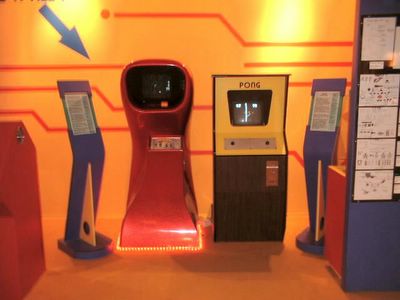It's More Fun to Compute
I really should have stayed home today to catch up on my schoolwork, but that plan went to pot when I found out today was the last day I could see this:

These two kiosks are arcade machines. But they aren't just any ordinary arcade machines. They are among the first EVER goddamn coin-operated arcade machines!! Geeks, look closely at the one on the right...it's PONG!!! For the less-informed, Pong is widely thought to be the first ever video game (though strictly, it isn't), coming out in 1972. That year, it had all the ground-breaking, earth-shattering complexity of two paddles (represented by short vertical lines) moving up and down both ends of the screen, bouncing a ball (represented by oooh, a dot) back and forth. And huge score counters at the top of the screen.
These two machines, along with over 70 other classics, were on display at the Planet Games exhibition at the Singapore Science Centre. The best bit was that all were playable, and each visitor was issued a number of tokens upon entry...now how cool is that! Depending on how old you are, some of the following names may bring a tear of nostalgia to your eye, or do nothing at all: Q-Bert, Donkey Kong, Frogger, Centipede, Galaxian, Dig Dug, Tron, Space Invaders, Defender, Breakout. These were all there, in fine working order. Pity about the Pac-Man machine though; I think its breakdown must've been caused by overuse.
This retro arcade formed the 'past' section of the exhibition, which also had 'present' and 'future' installations. But I couldn't care less for the latter two. I have a soft spot for all the games mentioned above for two reasons: (i) I remember seeing them in advertisements in my elder brother's comics when I was a very young boy; (ii) when I was a little older, I played a number of them on arcade emulators on my PC.

It's an Atari: today, one of these would probably fit in your mobile phone.
But there is a third, larger reason for my fascination here. To me, first-generation video games don't just open a window to the history of gaming. They also open a window to the history of human thought and society. The speed at which computer technology evolves--which is unparalleled in other domains of technology--accelerates and compresses time in such a way that epochal changes can be reflected in a matter of decades. Consider this extremely amusing video clip archived on eBaum's World. It's a news feature on a new development in the early 90's you might have heard of: the internet.
The unique nature of time in the gaming world can also be seen in a telling remark at the entrance of the Planet Games exhibition, which exhorts visitors to treat the machines "with care for what they are--antiques!". Now, taken out of context, the word 'antique' reasonably connotes terms like 'art', 'civilisation' and 'centuries old'. Yet, you'd be hard-pressed not to agree that a working Pac-Man arcade machine is an antique. It's rare, classic, no longer made or readily available, and a definitive cultural artefact from a different era. Which in this case happens to be just twenty years ago.
How's that for perspective?
These two machines, along with over 70 other classics, were on display at the Planet Games exhibition at the Singapore Science Centre. The best bit was that all were playable, and each visitor was issued a number of tokens upon entry...now how cool is that! Depending on how old you are, some of the following names may bring a tear of nostalgia to your eye, or do nothing at all: Q-Bert, Donkey Kong, Frogger, Centipede, Galaxian, Dig Dug, Tron, Space Invaders, Defender, Breakout. These were all there, in fine working order. Pity about the Pac-Man machine though; I think its breakdown must've been caused by overuse.
This retro arcade formed the 'past' section of the exhibition, which also had 'present' and 'future' installations. But I couldn't care less for the latter two. I have a soft spot for all the games mentioned above for two reasons: (i) I remember seeing them in advertisements in my elder brother's comics when I was a very young boy; (ii) when I was a little older, I played a number of them on arcade emulators on my PC.

It's an Atari: today, one of these would probably fit in your mobile phone.
But there is a third, larger reason for my fascination here. To me, first-generation video games don't just open a window to the history of gaming. They also open a window to the history of human thought and society. The speed at which computer technology evolves--which is unparalleled in other domains of technology--accelerates and compresses time in such a way that epochal changes can be reflected in a matter of decades. Consider this extremely amusing video clip archived on eBaum's World. It's a news feature on a new development in the early 90's you might have heard of: the internet.
The unique nature of time in the gaming world can also be seen in a telling remark at the entrance of the Planet Games exhibition, which exhorts visitors to treat the machines "with care for what they are--antiques!". Now, taken out of context, the word 'antique' reasonably connotes terms like 'art', 'civilisation' and 'centuries old'. Yet, you'd be hard-pressed not to agree that a working Pac-Man arcade machine is an antique. It's rare, classic, no longer made or readily available, and a definitive cultural artefact from a different era. Which in this case happens to be just twenty years ago.
How's that for perspective?

0 Comments:
Post a Comment
<< Home